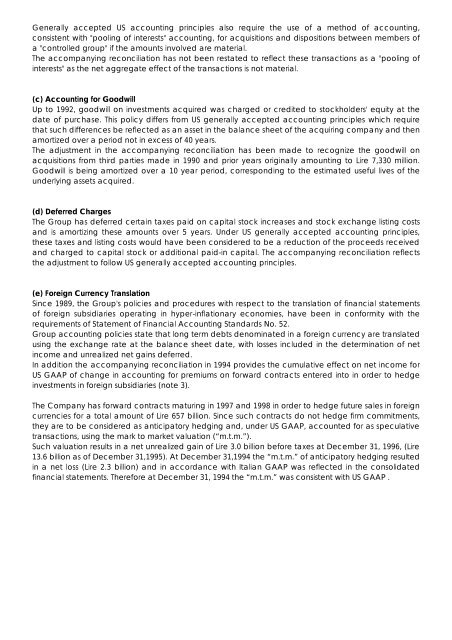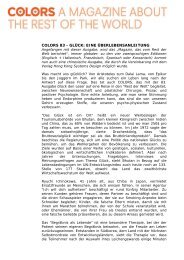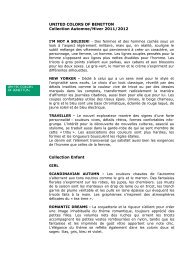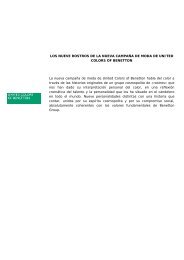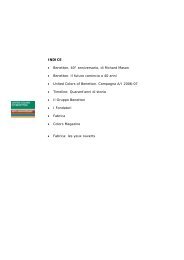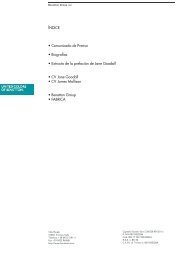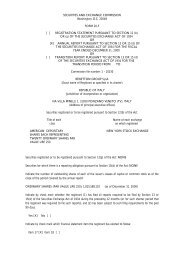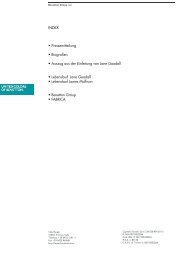The Benetton Group Annual Report 1996
The Benetton Group Annual Report 1996
The Benetton Group Annual Report 1996
Create successful ePaper yourself
Turn your PDF publications into a flip-book with our unique Google optimized e-Paper software.
Generally accepted US accounting principles also require the use of a method of accounting,<br />
consistent with "pooling of interests" accounting, for acquisitions and dispositions between members of<br />
a "controlled group" if the amounts involved are material.<br />
<strong>The</strong> accompanying reconciliation has not been restated to reflect these transactions as a "pooling of<br />
interests" as the net aggregate effect of the transactions is not material.<br />
(c) Accounting for Goodwill<br />
Up to 1992, goodwill on investments acquired was charged or credited to stockholders' equity at the<br />
date of purchase. This policy differs from US generally accepted accounting principles which require<br />
that such differences be reflected as an asset in the balance sheet of the acquiring company and then<br />
amortized over a period not in excess of 40 years.<br />
<strong>The</strong> adjustment in the accompanying reconciliation has been made to recognize the goodwill on<br />
acquisitions from third parties made in 1990 and prior years originally amounting to Lire 7,330 million.<br />
Goodwill is being amortized over a 10 year period, corresponding to the estimated useful lives of the<br />
underlying assets acquired.<br />
(d) Deferred Charges<br />
<strong>The</strong> <strong>Group</strong> has deferred certain taxes paid on capital stock increases and stock exchange listing costs<br />
and is amortizing these amounts over 5 years. Under US generally accepted accounting principles,<br />
these taxes and listing costs would have been considered to be a reduction of the proceeds received<br />
and charged to capital stock or additional paid-in capital. <strong>The</strong> accompanying reconciliation reflects<br />
the adjustment to follow US generally accepted accounting principles.<br />
(e) Foreign Currency Translation<br />
Since 1989, the <strong>Group</strong>'s policies and procedures with respect to the translation of financial statements<br />
of foreign subsidiaries operating in hyper-inflationary economies, have been in conformity with the<br />
requirements of Statement of Financial Accounting Standards No. 52.<br />
<strong>Group</strong> accounting policies state that long term debts denominated in a foreign currency are translated<br />
using the exchange rate at the balance sheet date, with losses included in the determination of net<br />
income and unrealized net gains deferred.<br />
In addition the accompanying reconciliation in 1994 provides the cumulative effect on net income for<br />
US GAAP of change in accounting for premiums on forward contracts entered into in order to hedge<br />
investments in foreign subsidiaries (note 3).<br />
<strong>The</strong> Company has forward contracts maturing in 1997 and 1998 in order to hedge future sales in foreign<br />
currencies for a total amount of Lire 657 billion. Since such contracts do not hedge firm commitments,<br />
they are to be considered as anticipatory hedging and, under US GAAP, accounted for as speculative<br />
transactions, using the mark to market valuation (“m.t.m.”).<br />
Such valuation results in a net unrealized gain of Lire 3.0 billion before taxes at December 31, <strong>1996</strong>, (Lire<br />
13.6 billion as of December 31,1995). At December 31,1994 the “m.t.m.” of anticipatory hedging resulted<br />
in a net loss (Lire 2.3 billion) and in accordance with Italian GAAP was reflected in the consolidated<br />
financial statements. <strong>The</strong>refore at December 31, 1994 the “m.t.m.” was consistent with US GAAP .


